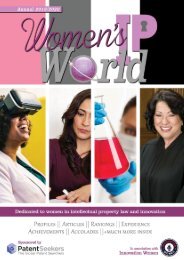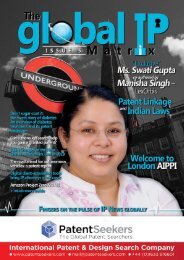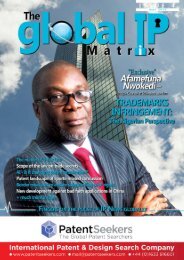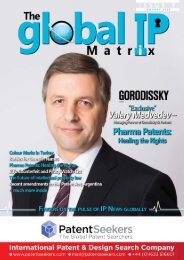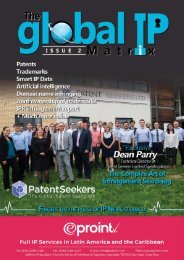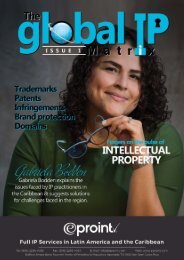Global IP Matrix - Issue 8
Dear Readers We are delighted to present you with issue 8 of The Global IP Matrix magazine! Once again, we have fantastic content delivered to you by industry professionals who are experts in their field. This issue explores IP & Innovation in Africa, anti-counterfeiting measures in the Caribbean, IPR Infringement in China, plus many more engaging articles around the IP ecosystem. It's been a challenging few months; however, we are grateful that our clients and contributors share our vision. Together, we are heading for better times. We cannot thank our authors enough for their time and efforts to keep you, our audience up to date with news and stories from their own perspective and expertise. Look out for our next edition, in January 2021 and until then, stay safe, healthy & happy. Elvin Hassan – Editor
Dear Readers
We are delighted to present you with issue 8 of The Global IP Matrix magazine!
Once again, we have fantastic content delivered to you by industry professionals who are experts in their field.
This issue explores IP & Innovation in Africa, anti-counterfeiting measures in the Caribbean, IPR Infringement in China, plus many more engaging articles around the IP ecosystem.
It's been a challenging few months; however, we are grateful that our clients and contributors share our vision. Together, we are heading for better times.
We cannot thank our authors enough for their time and efforts to keep you, our audience up to date with news and stories from their own perspective and expertise.
Look out for our next edition, in January 2021 and until then, stay safe, healthy & happy.
Elvin Hassan – Editor
Create successful ePaper yourself
Turn your PDF publications into a flip-book with our unique Google optimized e-Paper software.
Offensive Trademarks
Raise Doubts, or not?
Refusal to register based on this
norm is not explained by the
patent office’s examiner, and
sometimes it is not actually clear
why this legal norm was applied.
Yes, it happens.
As practice shows, when challenging
such refusals under the administrative
procedure, indicating only the relevant
clause and number of the article of the
Civil Code is regarded as not proved and
10, 14, 18, and 25 and services of classes 35, 39, 41, and 44, according to ICGS, this
designation is not “scandalous” and may be registered as a trademark (reg. No. 521942).
(Rospatent’s Decision dated 31 July 2014).
Surnames of prominent figures may be recognised as “scandalous”
marks.
Yes, they may be.
In some instances, when designations representing or comprising as their element
surnames, names, or alias names of any prominent figures in politics, economics,
science, culture, etc., both from the past and present, are claimed, their registration as a
trademark may be regarded detrimental to the public interests and (or) morality.
As discussed by Tatiana Pogrebinskaya, Trademark Attorney
at Gorodissky & Partners, Russia - www.gorodissky.com
Offensive trademarks are
designations that, by virtue
of Sub-clause 2 of Clause 3 of
Article 1483 of the Civil Code,
may not be registered as
trademarks if they represent
designations or comprise
elements detrimental to the
public interests, humanity,
and principles of morality.
Such designations may include further
designations that represent or comprise
words, phrases, images, three-dimensional
and any other designations or their
combinations, which, both themselves
and used as trademarks, contradict the
legal foundations of public order and (or)
may trigger indignation of the society
members based on the universal moral
principles.
The practice of applying this legal
prohibition on the registration of
“scandalous” marks is characterised as one
of the most challenging and controversial
issues due to objective reasons as well
as since each expert examining an
application relies on his own “moral code”.
Besides, public interest and morality are
shifting over time. All this gives rise to
various myths about this legal norm.
We will focus on some of them and
decipher what is true and what is not.
Patent offices of some countries
avoid applying the norm
prohibiting registration of
“scandalous” marks.
It is not true.
As a rule, the law of foreign countries concerning the protection of trademarks contains
a prohibition on the registration of “scandalous” marks, which is applied along with
other grounds for refusal, both during the expert examination of a claimed designation
for registration as a trademark and during appeals against trademarks if its registration
is detrimental to the public interests (or public order) and (or) morality.
It is impossible to overcome a refusal to register based on this norm.
It is not always true.
The analysis of practice shows that it is possible to overcome such a refusal. However, it
is usually very difficult. There are cases where it does not work (because the applicant
failed to find enough arguments to disprove the expert’s arguments), or it is impossible
in general. For example, if the claimed designation is semantically negative and evokes
unpleasant associations.
For instance, the patent office refused to register the claimed designation for the
goods “rum” (class 33 according to ICGS), since the word “CONTRABANDO” included
in it is translated from Spanish into Russian as “smuggling” — illegal transportation
of goods, valuables, and any other items across the national border accompanied by a
violation of the customs regulations. On this basis, it was concluded that registration of
such a mark is detrimental to the public interests, since any import and sale of smuggled
goods, particularly alcoholic products, violates the Russian Federation’s law. However,
the applicant was able to find enough arguments and provide the necessary evidence
that this designation did not contradict public interests. There even was the history
of the origin of this name (this rum was smuggled into Spain in a tourist’s suitcase)
(Rospatent’s Decision dated 31 July 2018). As a result, the mark was registered under
No. 674916.
is not taken into account during further
consideration of the dispute. However,
there are cases when challenging refusals to
register trademarks for other grounds, the
panel of the patent office for considering
such disputes may, at its discretion,
apply this norm as an additional ground
for refusing registration of the mark. In
such a case, the applicant, already during
consideration of the dispute, has to find
arguments proving that the designation
claimed by him in general and (or) its
registration as a trademark corresponds
to the public interests and (or) morality
principles.
One and the same designation
may be recognised as
“scandalous” for some goods and
services and “not scandalous” for
others.
Yes, it is true.
For example, the registration of the
designation
containing
the word element “Sexymoda” (translated
from English as sexy fashion) is
detrimental to the public interests for
part of the goods and services specified
in application No. 2012735078 for
registration of a trademark, in particular,
for: “Radioactive substances for medical
purposes” (class 05 according to ICGS),
“children’s pants [clothes]” (class 25
according to ICGS), “organisation of
[educational] competitions; amusement
parks” (class 41 according to ICGS). For
other claimed goods of classes 03, 05,
For example, the claimed designation
under application No.
2011716217 (for goods of Class 33 and services of Classes 41 and 43 according to
ICGS) reproduces the surname of a famous Russian chemist D. I. Mendeleev, for which
reason registration of a trademark in the applicant’s name will be detrimental to the
public interests. When making the decision refusing to register this mark, the patent
office considered the importance of that person and his scientific heritage for Russia. It
proceeded from the fact that the outstanding Russian scientist’s name and reputation
were the public domain. The grant of the exclusive right to the said designation in the
applicant’s name would give him unreasonable precedence over other business entities.
(Rospatent’s Decision dated 31 August 2012).
Along with this, let us note that there is also practice when the designations, which do
not exactly reproduce the surname of prominent figures, but which may cause someone
to see the veiled use of the surnames of such figures, are classified as “scandalous”.
For example, the claimed designation
was described as a coined word
designation “PU IN,” having no semantic meaning. A space between the two claimed
syllables makes it possible to put any letter between them. However, due to the wellknown
character of the name of Russian President Vladimir Putin, not only in the
Russian Federation but also worldwide, this designation may be perceived by the
consumer precisely in conjunction with the surname Putin. In this regard, Rospatent
considers that any use of the claimed designation as a means of labelling for food and
beverages (goods in Classes 29, 30, 32, and 33 according to ICGS) will have a tinge of
disrespect towards a well-known and acting politician, which, in fact, is detrimental to
moral principles.
(Rospatent’s Decision dated 8 December 2008 under application No. 2006721262)
6 www.gipmatrix.com www.gipmatrix.com
7







